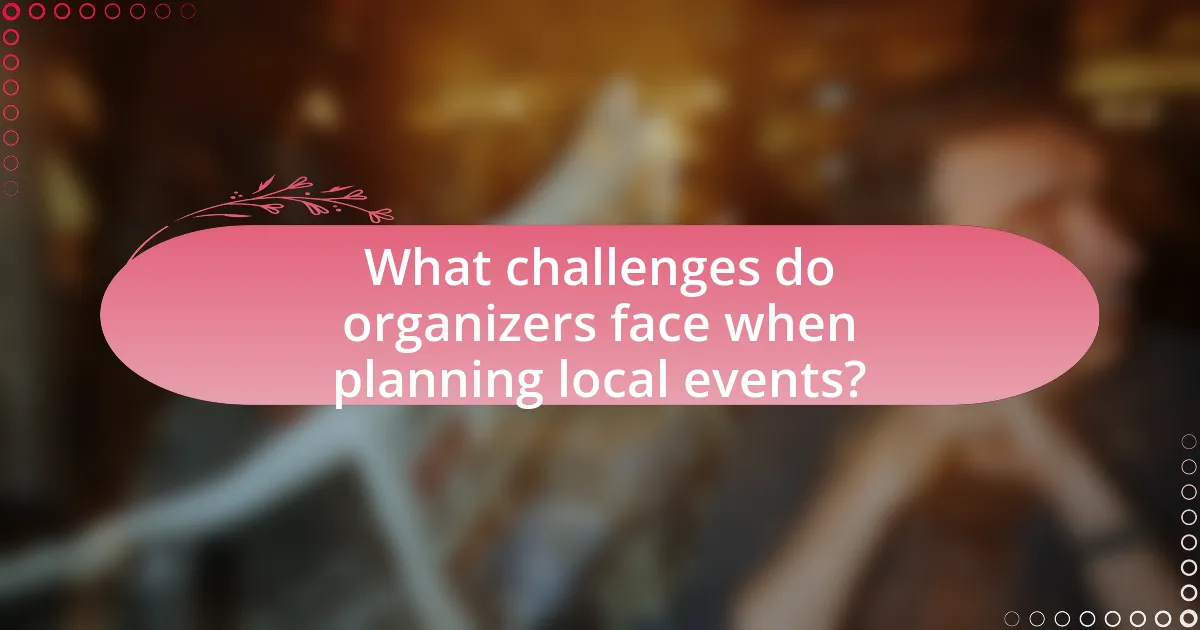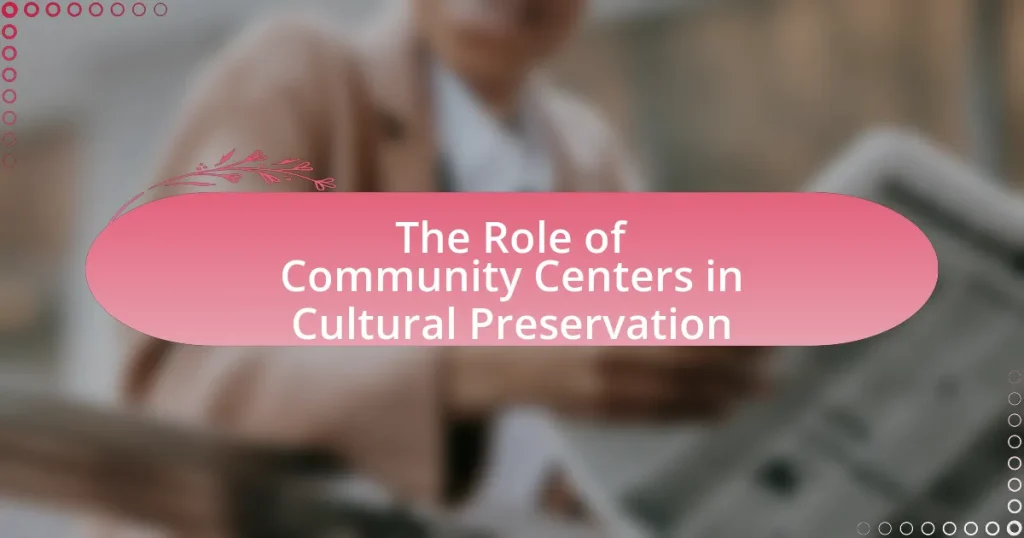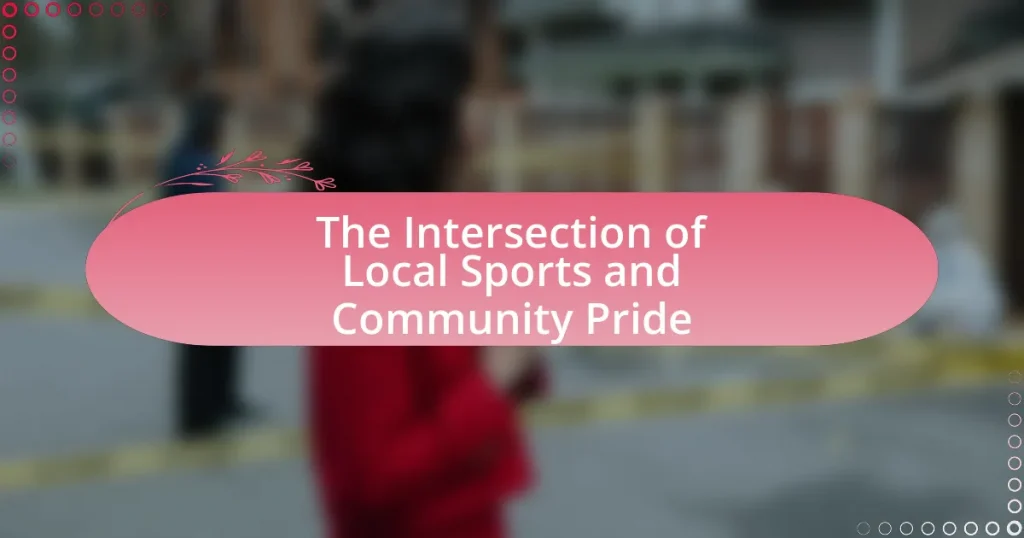The article “An Insider’s Look at Planning a Successful Local Event: Tips from Organizers” provides a comprehensive guide on the essential elements of organizing a local event. Key topics include defining the event’s purpose, establishing a budget, selecting an appropriate venue, and implementing effective promotional strategies. It emphasizes the importance of understanding the target audience and coordinating logistics to ensure a smooth execution. Additionally, the article addresses common challenges faced by organizers, such as budget constraints and unforeseen circumstances, while offering practical tips for post-event evaluation and continuous improvement.

What are the key elements of planning a successful local event?
The key elements of planning a successful local event include defining the event’s purpose, establishing a budget, selecting a suitable venue, promoting the event effectively, and coordinating logistics. Defining the event’s purpose ensures clarity in objectives, which guides all subsequent planning decisions. Establishing a budget is crucial as it dictates the scope and scale of the event, with 30% of event planners reporting budget constraints as a significant challenge. Selecting a suitable venue involves considering capacity, accessibility, and amenities, which directly impact attendee experience. Effective promotion through social media, local partnerships, and community outreach increases attendance, with studies showing that targeted marketing can boost participation by up to 50%. Finally, coordinating logistics, including scheduling, staffing, and equipment needs, is essential for smooth execution, as 70% of event failures are attributed to poor logistical planning.
How do you define the purpose of the event?
The purpose of the event is defined as the specific goals and objectives that the organizers aim to achieve through the gathering. This includes fostering community engagement, raising funds for a cause, or promoting a product or service. For instance, a charity event’s purpose may be to raise awareness and funds for a specific nonprofit organization, which can be measured by the amount of money raised and the number of attendees engaged in the cause.
What factors should be considered when identifying the target audience?
When identifying the target audience, demographic factors such as age, gender, income level, and education should be considered. These factors help in understanding the characteristics and preferences of potential attendees, which can influence event planning and marketing strategies. For instance, a study by the Pew Research Center indicates that different age groups have varying interests and engagement levels with local events, highlighting the importance of tailoring content to specific demographics. Additionally, psychographic factors like interests, values, and lifestyle choices are crucial, as they provide insights into what motivates the audience to attend events. Understanding these factors ensures that the event resonates with the intended audience, ultimately leading to higher attendance and engagement.
How does the event’s purpose influence its planning process?
The event’s purpose directly shapes its planning process by determining the goals, target audience, and necessary resources. For instance, a charity event aims to raise funds, which influences the selection of venue, marketing strategies, and partnerships with sponsors. Additionally, the purpose dictates the event’s format; a networking event will prioritize opportunities for interaction, while a conference will focus on content delivery. This alignment ensures that all planning elements, such as budget allocation and timeline, are tailored to effectively achieve the intended outcomes, thereby enhancing the overall success of the event.
What are the essential logistical considerations?
Essential logistical considerations include venue selection, transportation, and resource allocation. Venue selection involves assessing capacity, accessibility, and amenities to ensure it meets the event’s needs. Transportation logistics require planning for attendee access, parking, and public transit options to facilitate smooth arrivals and departures. Resource allocation focuses on budgeting, staffing, and equipment procurement, ensuring that all necessary materials and personnel are available for the event’s success. These considerations are critical for effective event management and directly impact attendee experience and operational efficiency.
How do you choose the right venue for the event?
To choose the right venue for an event, first assess the event’s specific requirements, including capacity, location, and amenities. The venue must accommodate the expected number of attendees comfortably, be easily accessible for guests, and provide necessary facilities such as audio-visual equipment and catering options. Research indicates that 70% of event success is attributed to the venue selection, highlighting its critical role in overall event satisfaction.
What role does budgeting play in event planning?
Budgeting is essential in event planning as it establishes financial parameters that guide all decision-making processes. A well-defined budget helps organizers allocate resources effectively, ensuring that all necessary components, such as venue, catering, and marketing, are adequately funded. According to a study by Eventbrite, 60% of event planners cite budget management as a critical factor in achieving event success, highlighting its importance in maintaining financial control and maximizing return on investment.
What strategies can be used for effective promotion?
Effective promotion strategies include utilizing social media marketing, local partnerships, and targeted advertising. Social media platforms like Facebook and Instagram allow event organizers to reach a broad audience quickly, with 73% of marketers believing that their efforts through social media marketing have been effective for their business (Buffer, 2021). Forming partnerships with local businesses can enhance visibility and credibility, as collaboration often leads to cross-promotion, benefiting all parties involved. Additionally, targeted advertising through platforms like Google Ads enables organizers to reach specific demographics, increasing the likelihood of attracting attendees who are genuinely interested in the event. These strategies collectively enhance outreach and engagement, leading to successful event promotion.
How can social media be leveraged for event marketing?
Social media can be leveraged for event marketing by creating targeted campaigns that engage potential attendees and build community around the event. Platforms like Facebook, Instagram, and Twitter allow organizers to share event details, create event pages, and utilize paid advertising to reach specific demographics. For instance, a study by Eventbrite found that 93% of event creators use social media to promote their events, highlighting its effectiveness in increasing visibility and attendance. Additionally, user-generated content, such as attendee posts and shares, can enhance credibility and attract more participants, as events with strong social media presence often see higher engagement rates.
What are the best practices for engaging local media?
The best practices for engaging local media include building relationships with journalists, crafting compelling press releases, and providing timely information. Establishing rapport with local reporters fosters trust and increases the likelihood of coverage. A well-written press release that highlights the event’s unique aspects and community impact captures attention and encourages media interest. Additionally, offering exclusive interviews or behind-the-scenes access can enhance the story’s appeal. According to a study by the Pew Research Center, 73% of journalists prefer receiving information directly from event organizers, emphasizing the importance of direct communication.

What challenges do organizers face when planning local events?
Organizers face several challenges when planning local events, including budget constraints, venue selection, and securing permits. Budget constraints often limit the scope of the event, making it difficult to allocate funds for essential services such as catering, entertainment, and marketing. Venue selection poses challenges due to availability, capacity, and suitability for the event type, which can affect attendance and overall experience. Additionally, securing permits can be a complex process, as it often involves navigating local regulations and timelines, which can delay planning and increase stress for organizers. These challenges are common in event planning and require careful management to ensure a successful outcome.
How can unforeseen circumstances impact event planning?
Unforeseen circumstances can significantly disrupt event planning by introducing unexpected challenges that require immediate attention and adaptation. For instance, inclement weather can lead to venue changes or cancellations, impacting logistics and attendee experience. Additionally, sudden changes in regulations, such as health mandates, can necessitate alterations in capacity or safety protocols, affecting the overall event structure. According to a study by the Event Safety Alliance, 70% of event planners reported that unexpected issues, including weather and regulatory changes, directly influenced their planning processes, highlighting the need for contingency strategies.
What contingency plans should be in place for weather-related issues?
Contingency plans for weather-related issues should include alternative venues, communication strategies, and safety protocols. Alternative venues allow for quick relocation in case of severe weather, ensuring the event can continue without significant disruption. Communication strategies, such as text alerts or social media updates, keep attendees informed about any changes or cancellations. Safety protocols, including evacuation plans and first aid stations, ensure the well-being of participants during adverse weather conditions. These measures are essential, as events can be significantly impacted by weather, with studies showing that over 30% of outdoor events face weather-related disruptions.
How can organizers prepare for low attendance?
Organizers can prepare for low attendance by implementing flexible planning strategies, such as adjusting the event format to accommodate smaller crowds and enhancing marketing efforts to boost participation. For instance, offering virtual attendance options can attract those unable to attend in person, thereby increasing overall engagement. Additionally, historical data indicates that events with contingency plans, such as scaled-down activities or alternative scheduling, can maintain participant interest even with lower turnout. According to a study by Eventbrite, 70% of event organizers who adapted their strategies reported a more positive experience despite attendance fluctuations.
What are common pitfalls to avoid during the planning process?
Common pitfalls to avoid during the planning process include inadequate budgeting, poor communication, and lack of contingency planning. Inadequate budgeting can lead to overspending or insufficient funds, which often results in compromised event quality. Poor communication among team members can create misunderstandings and misalignment on tasks, ultimately affecting the event’s execution. Lack of contingency planning can leave organizers unprepared for unexpected challenges, such as weather changes or vendor cancellations, which can derail the event. These pitfalls are frequently cited by experienced event organizers as critical factors that can undermine the success of local events.
How can miscommunication among team members affect the event?
Miscommunication among team members can lead to significant disruptions in event planning and execution. When team members fail to share accurate information, it can result in overlapping responsibilities, missed deadlines, and inconsistent messaging to stakeholders. For instance, a study by the Project Management Institute found that ineffective communication is a primary contributor to project failure, with 57% of project failures attributed to poor communication. This statistic underscores the critical importance of clear communication in ensuring that all team members are aligned on their roles and responsibilities, ultimately affecting the overall success of the event.
What mistakes should be avoided in budgeting?
Common mistakes to avoid in budgeting include underestimating costs, failing to account for unexpected expenses, and not tracking spending regularly. Underestimating costs can lead to insufficient funds, as many event organizers overlook expenses such as permits, venue fees, and catering. Failing to account for unexpected expenses, like last-minute changes or emergencies, can derail a budget, leading to financial strain. Not tracking spending regularly prevents organizers from identifying overspending early, which can result in budget overruns. According to a study by the Event Management Association, 60% of event planners reported that poor budgeting was a significant factor in event failures.

What insights can experienced organizers share about successful events?
Experienced organizers emphasize the importance of thorough planning and clear communication for successful events. They highlight that defining objectives and understanding the target audience are crucial steps that guide all subsequent decisions. For instance, a study by the Event Marketing Institute found that 84% of event marketers prioritize audience engagement, which directly correlates with event success. Additionally, experienced organizers recommend building a reliable team and delegating tasks effectively to ensure all aspects of the event are managed efficiently. This approach not only enhances productivity but also fosters a collaborative environment, leading to a more successful outcome.
What are the best practices for engaging volunteers and staff?
The best practices for engaging volunteers and staff include clear communication, recognition of contributions, and providing meaningful roles. Clear communication ensures that all team members understand their responsibilities and the event’s goals, which fosters a sense of purpose. Recognition of contributions, such as public acknowledgment or rewards, boosts morale and encourages continued involvement. Providing meaningful roles allows volunteers and staff to utilize their skills effectively, enhancing their commitment and satisfaction. Research indicates that organizations with strong volunteer engagement strategies see a 50% increase in retention rates, demonstrating the effectiveness of these practices.
How can effective training improve event execution?
Effective training enhances event execution by equipping staff with the necessary skills and knowledge to perform their roles efficiently. When event personnel undergo comprehensive training, they become familiar with the event’s objectives, logistics, and their specific responsibilities, leading to improved coordination and communication. Research indicates that organizations with well-trained teams experience a 20% increase in operational efficiency during events, as trained staff can anticipate challenges and respond proactively. This preparation minimizes errors and enhances the overall attendee experience, demonstrating the critical role of effective training in successful event execution.
What methods can be used to motivate volunteers during the event?
To motivate volunteers during the event, organizers can implement recognition programs, provide clear roles, and foster a sense of community. Recognition programs, such as awards or shout-outs, enhance volunteers’ feelings of appreciation, which has been shown to increase engagement and satisfaction. Clearly defined roles ensure that volunteers understand their responsibilities, leading to a more organized and efficient event, as evidenced by studies indicating that clarity in tasks reduces anxiety and increases performance. Additionally, creating a sense of community through team-building activities and social interactions encourages collaboration and strengthens commitment, which research has shown to be vital for volunteer retention and motivation.
What tips do organizers have for post-event evaluation?
Organizers recommend conducting surveys to gather feedback from attendees, as this provides direct insights into their experiences and satisfaction levels. Additionally, analyzing attendance data helps assess the event’s reach and engagement, while reviewing the budget and expenses ensures financial accountability. Documenting lessons learned during the event allows organizers to identify strengths and areas for improvement, which can enhance future events. These practices are supported by industry standards, which emphasize the importance of data-driven evaluations for continuous improvement in event planning.
How can feedback be effectively gathered from attendees?
Feedback can be effectively gathered from attendees through structured surveys and interactive feedback sessions. Surveys, both digital and paper-based, allow for quantitative data collection, enabling organizers to analyze responses efficiently. Interactive feedback sessions, such as focus groups or open forums, facilitate qualitative insights, allowing attendees to express their thoughts in detail. Research indicates that using a combination of these methods increases response rates and provides a comprehensive understanding of attendee experiences, as evidenced by a study published in the Journal of Event Management, which found that events employing mixed feedback strategies reported a 30% higher satisfaction rate among participants.
What metrics should be analyzed to measure event success?
To measure event success, key metrics include attendance numbers, participant engagement, revenue generated, and post-event feedback. Attendance numbers indicate the level of interest and reach of the event, while participant engagement can be assessed through social media interactions and session participation rates. Revenue generated reflects the financial viability of the event, and post-event feedback, often collected through surveys, provides insights into attendee satisfaction and areas for improvement. These metrics collectively offer a comprehensive view of the event’s effectiveness and areas for future enhancement.
What practical tips can help ensure a successful local event?
To ensure a successful local event, thorough planning and community engagement are essential. Organizers should start by defining clear objectives and target audiences, which helps tailor the event to meet specific needs. Engaging local stakeholders, such as businesses and community leaders, fosters support and increases attendance. Additionally, effective marketing strategies, including social media promotion and local advertising, can significantly enhance visibility.
Logistics must also be meticulously planned, covering venue selection, permits, and accessibility to accommodate all attendees. According to a study by Eventbrite, 80% of event organizers believe that early ticket sales and marketing are crucial for success, highlighting the importance of proactive outreach. Finally, gathering feedback post-event allows for continuous improvement in future planning.















